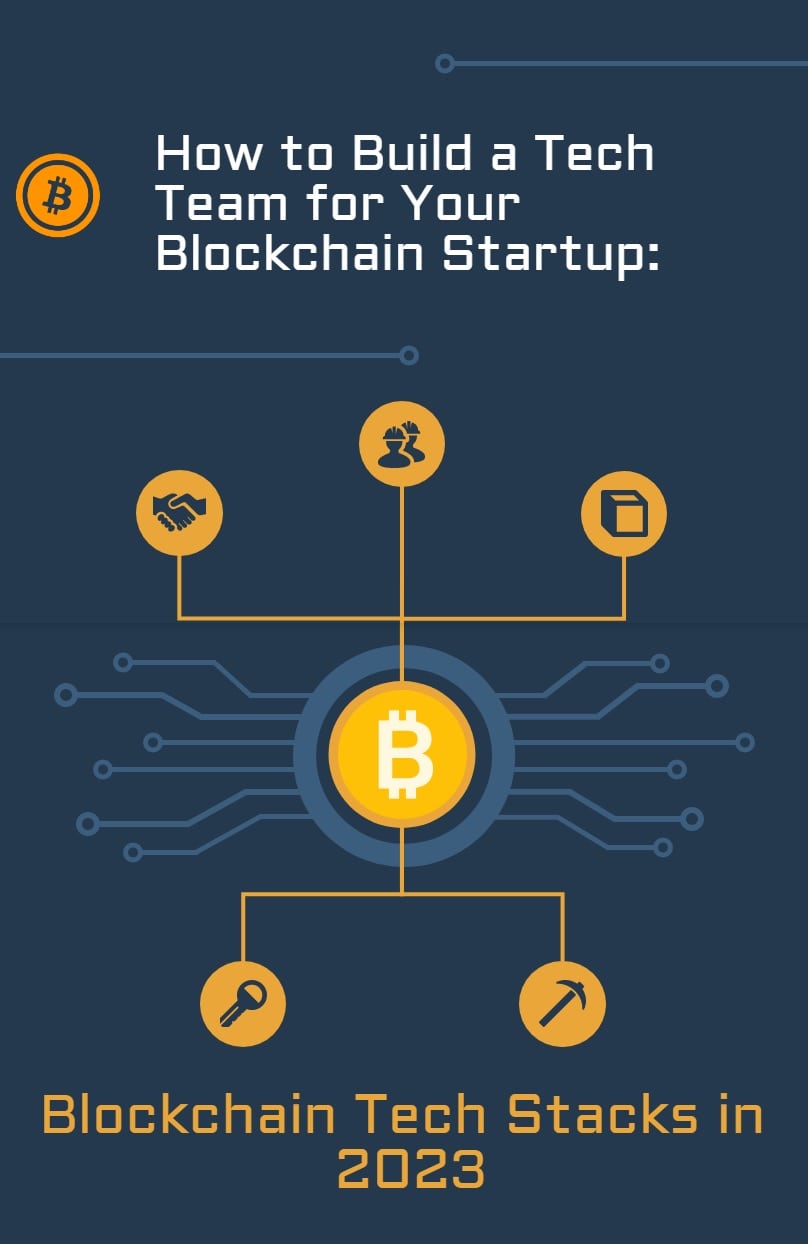How to Build a Tech Team for Your Blockchain Startup: Blockchain Tech Stacks in 2023
Overview of blockchain technology
Blockchain technology forms a distributive ledger system that connects all its users in a peer-to-peer network. It employs the use of blocks connected cryptographically to keep a record of all these transactions. Once stored, they are almost impossible to alter, without the permission of all connected parties. Such forethought before confirming any transaction ensures there is no fraudulent activity and the process is completely transparent. So, how to build a tech team for blockchain?
Table of Contents
Additionally, this mode of data storage saves time and is more user-friendly as it displays data to all users. Since this technology escapes the dictatorship of one centralized authority, its decentralized framework requires no intermediate intervention, as the buyer and seller are connected personally. Hence, the rising popularity of blockchain technology.
Importance of building a skilled tech team for a blockchain startup
Blockchain technology employs an intricate and complex process, subject to rapid change. A skilled tech team can streamline the development process by leveraging their knowledge and experience. They can make informed decisions, adopt best practices, and implement efficient coding and development techniques. This will ensure that your team stays updated with the latest trends, innovations, and advancements.
II. Key Roles in a Blockchain Tech Team
Blockchain Developer: Primary role for tech team for a blockchain startup
A blockchain developer specializes in developing blockchain applications and smart contracts. They have a deep understanding of blockchain platforms like Ethereum, Hyperledger, and others. And they are proficient in programming languages such as Solidity, Vyper, or Chaincode, depending on the chosen blockchain platform. Blockchain developers design and implement decentralized applications (DApps) and ensure the secure and efficient integration of business logic with blockchain protocols.
Backend Developer
A backend developer focuses on the server-side development and infrastructure required to support tech team for a blockchain startup. They are responsible for building the backend systems, APIs, and databases that interact with the blockchain. Backend developers work closely with blockchain developers to integrate smart contracts and implement necessary functionalities such as transaction processing, data validation, and integration with external systems.
Frontend Developer
A front-end developer is responsible for creating user interfaces (UI) and user experiences (UX) for blockchain applications. They work on client-side development, designing and implementing visual elements, user interactions, and front-end functionalities. Frontend developers often use web development frameworks like React.js, Angular, or Vue.js to build intuitive and responsive UIs that interact with the blockchain backend.
Security Specialist
A security specialist focuses on ensuring the security and integrity of the blockchain application in a tech team for a blockchain startup. They are well-versed in blockchain security best practices, cryptography, and secure coding principles. Security specialists conduct security audits, penetration testing, and vulnerability assessments to identify and mitigate potential risks. They implement security measures such as encryption, access control, and secure key management to protect the blockchain system from unauthorized access and cyber threats.
DevOps Engineer
A DevOps engineer plays a critical role in the development, deployment, and operation of the blockchain application. Because they are responsible for establishing the development infrastructure in the tech team for a blockchain startup, implementing automation processes, and managing the deployment pipeline. DevOps engineers use tools like Docker, Kubernetes, or Jenkins to automate build, test, and deployment processes. They ensure scalability, reliability, and continuous integration/continuous deployment (CI/CD) of the blockchain application.
Data Scientist
A data scientist brings expertise in analyzing and extracting insights from blockchain data. They leverage statistical modeling, machine learning, and data visualization techniques to extract meaningful information and patterns from blockchain data. Data scientists help in optimizing blockchain applications, enhancing performance, and identifying opportunities for improvement. They also assist in leveraging blockchain data for business intelligence and decision-making processes.
III. Evaluating the Expertise and Experience of New Tech Team for Blockchain
Security and Best Practices:
Blockchain development requires a strong focus on security to protect against vulnerabilities, hacks, and data breaches. Assessing candidates’ knowledge of blockchain security best practices, secure coding principles, and cryptography ensures they can develop secure applications and implement appropriate security measures to protect the blockchain system.
Practical Experience and Projects:
Practical experience in blockchain development is valuable in assessing candidates’ ability to apply their knowledge in real-world scenarios. But reviewing their past projects, contributions to open-source blockchain projects, or participation in blockchain hackathons provides insights into their practical skills, collaboration abilities, and understanding of industry standards.
Continuous Learning and Adaptability:
The blockchain industry is rapidly evolving, with new technologies and frameworks emerging frequently. Hence assessing candidates’ enthusiasm for continuous learning in a tech team for a blockchain startup, their ability to adapt to new technologies and industry trends, and their willingness to stay updated with the latest developments ensure they can contribute to the long-term growth and success of your blockchain startup.
IV. Building a Collaborative Culture
Creating an inclusive and collaborative work environment
Foster an inclusive work environment that values diversity in terms of backgrounds, experiences, and perspectives. Encourage diversity in hiring practices and ensure that team members feel respected and included, regardless of gender, race, ethnicity, or other characteristics.
So, create an environment where team members feel empowered to contribute their ideas, take ownership of their work, and make decisions. And encourage autonomy and provide opportunities for individuals to take on leadership roles, allowing them to contribute to the team’s success and foster a sense of ownership.
Encouraging open communication and knowledge sharing
Establish open and transparent communication channels within the team. Encourage regular team meetings, stand-ups, or check-ins where team members can discuss progress, challenges, and share updates. Foster an environment where everyone feels comfortable expressing their opinions, providing feedback, and seeking help.
Emphasize the importance of documenting processes, best practices, and lessons learned. Encourage team members to contribute to internal wikis, knowledge bases, or documentation repositories. This ensures that knowledge is shared and accessible to all team members, even when working on different aspects of the project or during employee transitions.
Providing opportunities for professional development for your blockchain tech team
- Offer training programs, workshops, and educational resources to enhance the skills and knowledge of team members.
- Establish mentorship programs where experienced team members can guide and support junior members.
- Provide clear career progression paths and growth opportunities within the organization. Recognize and reward exceptional performance.
Conclusion Building Tech Team for Blockchain
By implementing these practices, you can cultivate a collaborative culture that encourages teamwork, open communication, and continuous learning. This not only improves the overall efficiency and effectiveness of the tech team but also contributes to the long-term success of your blockchain startup.

Ananya Prisha is an enterprise level Agile coach working out of Hyderabad (India) and also founder of High Level PM Consultancy. Her goal has been to keep on learning and at the same time give back to the community that has given her so much.











The blog offers insightful information on the most recent blockchain technology stacks, giving a professional and the article covers various aspects, from understanding the roles and skills required for a successful tech team to exploring the emerging tech stacks in the block chain space. Overall great post!
This blog provides invaluable insights on building a tech team for a blockchain startup, empowering me with knowledge to navigate the ever-evolving blockchain tech stacks in 2023!